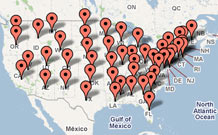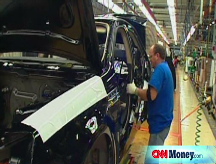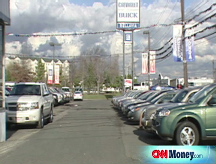Auto crisis roils state budgets nationwide
Already cash-strapped states would be hit hard by the collapse of even one of the Big 3. Sales taxes, income taxes would suffer, as unemployment and Medicaid costs rise
NEW YORK(CNNMoney.com) -- The Big Three automakers' troubles are wreaking havoc on state and local budgets far beyond the Rust Belt. And a collapse of even one of Detroit's car manufacturers would hit governments while they are down.
States and cities around the nation are already slashing budgets and services as the deepening economic downturn shrinks their coffers. To close their budget gaps, governments are cutting public health programs, reducing aid to public school and universities, and laying off workers.
Problems in the auto industry are only exacerbating this turmoil. Not only have nearly 800,000 people lost car-related jobs this year, accounting for 40% of the increase in unemployment, but auto sales are at a 26-year low and at least 660 dealerships have closed their doors.
This means state and local governments are collecting less in personal income taxes, corporate business taxes and sales taxes -- all critical to funding their operations. State tax revenue fell 2.6%, when adjusted for inflation, in the third quarter, according to preliminary figures from the Rockefeller Institute of Government.
"If we see a significant falloff in employment and a continued decline in auto sales, the states are really going to see it and feel it," said Scott Pattison, executive director of the National Association of State Budget Officers. "It just hits so many sources of revenue."
Any additional weakening of the auto industry would further reduce government revenues, while increasing the amount the public sector has to lay out for unemployment benefits, welfare and Medicaid, experts said.
A 50% reduction in the Big Three's domestic operations, for instance, would result in 2.5 million people losing their jobs, according to the Center for Automotive Research. That would drain $20.5 billion in personal income taxes at the federal, state and local levels in 2009, while forcing the public sector to spend an additional $11.9 billion in benefits.
Every state would feel the impact. Even if only GM, the most troubled of the automakers, shut down, 914,000 jobs would be lost nationwide, according to the Economic Policy Institute. This includes people who work in the plants, in auto suppliers and in businesses that support the industry, such as nearby restaurants and shops.
Of course, Michigan, Indiana and Ohio would be among the hardest hit, losing 2.5%, 1.4% and 1.1% of each state's total employment, respectively, the institute found. But all would see some decline in jobs, with Alabama losing 1.1% of its state workforce and New Hampshire shedding 0.6%.
"When people lose their jobs, it has a disproportionate effect on the tax base because these are good jobs with good wages," said Robert E. Scott, senior international economist at the Economic Policy Institute. "The demand for services goes up, while tax revenue goes down. It's a real recipe for disaster for state and local governments."
The slowdown in consumer demand for cars is also putting a crimp in state budgets. Americans bought 37% fewer cars in November than they did a year earlier, government figures show.
Though precise figures are difficult to come by, this big-ticket item accounts for about 12% to 15% of sales tax revenues in many states, estimates the Center on Budget and Policy Priorities.
Alabama, for one, has seen a 10.6% decline in sales taxes from car purchases for fiscal year 2008, which ended Sept. 30, according to state officials. Gov. Bob Riley is expected next week to announce how he will close a looming budget deficit, which the Center for Budget and Policy Priorities estimates is at $458 million, or 5.5% of the general fund.
Many states are already on the edge, experts say. At least 43 states are contending with budget shortfalls this year or next, according to the Center on Budget and Policy Priorities. They are the largest seen since the 2001 recession.
Soaring joblessness is also causing states to run out of money in their unemployment trust funds. The trust funds of five states are insolvent - meaning they have reserves of three months or less - while another eight state funds are nearly insolvent with reserves of four to six months, according to an October report from the National Employment Law Project. Six other states don't have enough money to cover a year of payments.
That's why governors, mayor and other state and local officials have been pressuring President-elect Barack Obama to quickly pass a stimulus package once he takes office in January. They are looking for money for infrastructure projects, Medicaid and food stamp programs, among other items.
More than half the states have already cut spending, drained reserves or raised taxes and fees to balance their budget. But at least 37 states, plus the District of Columbia, have seen new gaps open that total $31.2 billion, or 7.2% of their budgets, the Center on Budget and Policy Priorities said.
The cuts often come from public services, according to the center. Rhode Island, for instance, has eliminated health coverage for 1,000 low-income parents, while New Jersey has trimmed funds for charity care in hospitals. Florida has frozen reimbursements to nursing homes and relaxes staffing standards, while Massachusetts is reducing funding for some early care programs. Kentucky is eliminating 10% of its public defender positions, while Colorado has instituted hiring freezes.
Michigan, of course, has suffered greatly from the troubles in the auto industry. Just this week, the state budget director announced that general fund revenues are expected to fall $540 million below May estimates.
"It's a very dire situation for local governments in Michigan," said Donald Grimes, senior research specialist at the University of Michigan.
Michigan Gov. Jennifer Granholm plans to shave $134 million from the budget, which would involve slashing policy and program funding by $40 million and making $10 million in administrative cuts. ![]()




